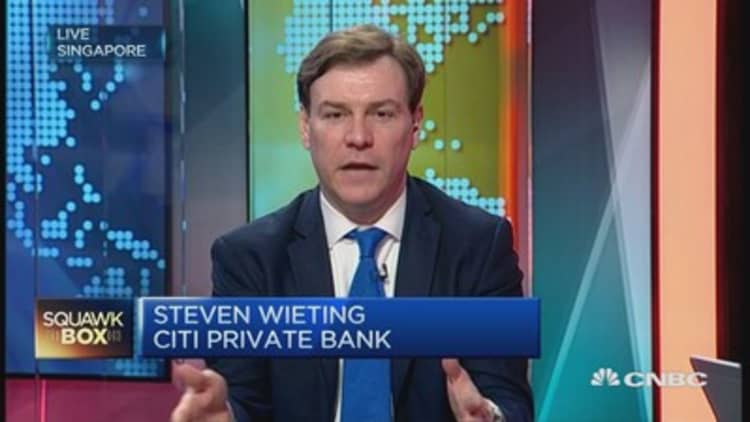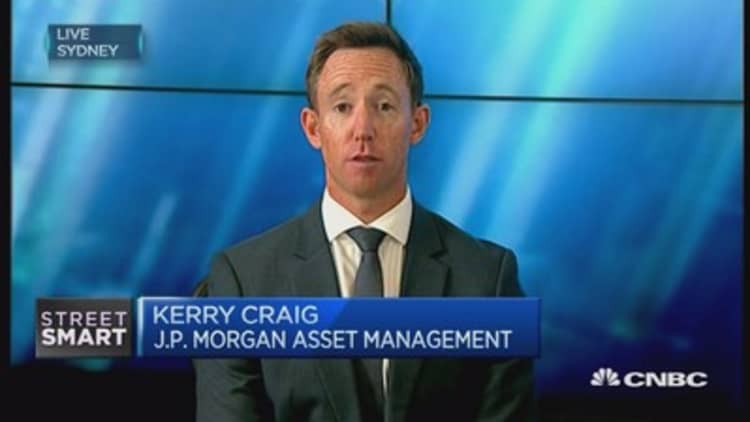


Markets are getting China and oil all out of proportion, and should remember that near-7 percent growth is a good thing while cheap oil stimulates consumption, according to two top strategists.
Steven Wieting, global chief investment strategist at Citi Private Bank, told CNBC's "Squawk Box" that maintaining the current level of hyper-sensitivity to China could end up badly damaging markets.
The rout that wiped $3.2 trillion off the value of stocks around world in the first two weeks of the year was largely due to worries about China's slowing growth, as well as its rollercoaster equities market and opaque currency management. Slumping global commodity prices exacerbated declines.
"We have had a 4 percentage-point decline in global equities for each one percent move in China's currency," Wieting said.
"If you were to extrapolate that, if we had a 25 percent drop in [the yuan], then the future would be worthless. Global equities will be zero."
Moves in the currency markets need to be taken in context as Wietling said other countries have, in the past, depreciated their currencies by as much as 25 percent against the dollar, without seeing similar volatile reactions in their stock markets.
"You realize that in the sell-offs, you get exaggerations of this impact," he said.
The People's Bank of China (PBOC) set its yuan mid-point rate at 6.5646 against the dollar on January 7, the lowest fix since 2011 and the largest daily change in the level of the fix since August 13, according to Reuters data. The move fueled concerns that China was devaluing its currency to support the faltering economy.
China's central bank lets the yuan spot rate rise or fall a maximum of 2 percent against the dollar, relative to the official fixing rate. The PBOC's weaker fix sparked a sharp sell-off in Chinese equities, triggering a circuit breaker that suspended trade just 29 minutes after markets opened, and for the rest of the day shortly after.
The panic spread to other major stock markets, and as China's markets continued to gyrate, and oil continued to slide, indexes around the world see-sawed for more than a week.
China fixation is here to stay
Attention stayed fixed on China this week, with key gross domestic product numbers for the fourth quarter and 2015 released on Tuesday. Full-year GDP came in at 6.9 percent, in line with the market expectations, but falling just short of the Chinese government's official 7 percent target.
Equity markets initially responded positively to the data, with indexes in Australia, Japan, and China closing up between 0.55 and 3.25 percent on January 19. In Europe, the pan-European closed 1 percent up while in Wall Street, the was up 0.17 percent.
Kerry Craig, global market strategist at J.P. Morgan Asset Management, told CNBC's "Street Signs" that this could have been because markets expect the PBOC to react to the marginally weaker data with stimulus.
"I think the market reaction yesterday was maybe, in China's case in particular, [an example of] bad news is good news," he said, adding there was a disconnect between what was currently happening in Chinese currency and equity markets and the real economy.
Many commentators are skeptical of China's GDP, which they have claimed does not reflect the true, slower rate of growth.
But while Craig noted that the data "is always a little bit suspiciously close towards just below the target", both he and Wieting said that even a sub-7 percent growth was better, compared to sluggish rates elsewhere and globally.
"If [China's growth] was half that, it would still be faster than global growth," said Wieting.
Vishnu Varathan from Mizuho Bank echoed similar sentiments in a note Wednesday afternoon.
"China's contribution to global economic growth is not just sizable, but remains dominant. With about 1.1 [percentage points] expected from China, in a global economy expected to grow 3.4 - 3.6 [percent], China is set to drive about a third of global growth."
Varathan added, "The simple fact is that for all the pessimism (some justified), China is set to remain the world's irrefutable growth engine; with any other country or region a far second."
Craig said that he expected new policy responses from Beijing, including more cuts in interest rates and reserve ratio requirements and more infrastructure spending, in order to ensure a soft economic landing.
And although markets overreacted to China, Wieting said that the economic giant did pose risks to investors, for example, in currency markets, due to China's declining foreign reserves.
'It's just too popular to be a pessimist'
The falling price of oil has also caused some unnecessary markets ructions, Craig said.
West Texas Intermediate (WTI) futures, which are traded in the United States, fell below $28 during Asian trading hours on Wednesday to $27.49, while globally traded Brent futures were down $28.15 a barrel.
OPEC remains very much at the center of the conundrum in oil markets; the oil cartel maintained output at its December meeting in Vienna, and now markets are bracing for as many as 500,000 additional barrels of oil per day to come from a sanctions-lite Iran.
The International Energy Agency warned on Tuesday that continued oversupply would put even more strain on the oil market.
But Craig said noted that, on the upside, Iran had behaved reasonably by not flooding the market with additional barrels.
"A lot of those oil tankers [in Iran] are still sitting in the harbor at the moment," he said.
But it will take time for oil prices to find a bottom, even as non-OPEC oil supply start to unwind, with rig counts falling in the U.S.
Craig said that in the meantime, low prices would give consumption a boost. "We should take advantage of that and [enjoy] these low prices while they are there."
But he acknowledged that the combination of China and low oil prices had created a feeling of excessively negative sentiment that was near unbeatable.
"It's just too popular to be pessimistic right now," he said.
— Neelabh Chaturvedi contributed to this report.



